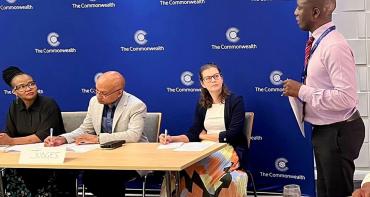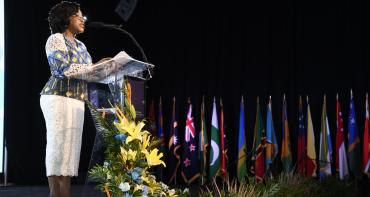The Commonwealth Secretariat is setting out to transform itself into a more fit-for-purpose partner to deliver the Sustainable Development Goals by 2030 in the face multiple, interlocking global crises.

The Commonwealth Secretariat is setting out to transform itself into a more fit-for-purpose partner to deliver the Sustainable Development Goals by 2030 in the face of multiple, interlocking global crises.
The Secretariat, in collaboration with the World Bank’s Global Evaluation Initiatives (GEI), recently hosted its second ‘Learning Week’, on the theme ‘Learn and adapt to accelerate action: Translating a decade of learning to transformational change in the Commonwealth’.
The event featured three days of intensive virtual discussions among high commissioners, representatives from key Commonwealth organisations and partner agencies, senior staff members at the Secretariat and independent experts.
Participants explored how the 56-year old Commonwealth Secretariat could adapt and remain relevant as a development partner, in a world marked by increasingly complex challenges and growing scepticism about the global multilateral system.
Unprecedented times
Opening the discussions, Commonwealth Secretary-General Patricia Scotland set the scene:
“We are here today to reflect on what we have learned in the past decade, and how these lessons can shape our impact in these truly unprecedented times. We are reviewing our ways of working and delivery models to respond to the COVID-19 pandemic’s impact in member countries.”
With less than a decade to go before the 2030 target date for achieving the 17 globally-agreed Sustainable Development Goals (SDGs), the pressure is on to maximise impact of development programmes and actions, while navigating a changing international landscape.
In her address, Director-General of the World Bank’s Independent Evaluation Group, Alison Evans elaborated: “This is a time of multiple crises, with the devastating effects of the pandemic intersecting with the global climate emergency, environmental degradation, rising conflicts and longstanding structural weaknesses in our economic and political systems.
“We started out in 2020 with a decade of delivery for the SDGs - this has now turned into an urgent race to avoid another lost decade with development.”
Key global trends
As a backdrop for discussions, independent researcher Olivia Kaye presented preliminary findings of a study on the impact of the Commonwealth Secretariat’s work over the past decade.
She laid out five key global trends that have shaped international development during this period: the decline of democracy; significant economic disruption, including rising inequality and public debt; increased focus on regional trade; increased focus on climate change; and unprecedented advances in technology.
She also noted that threats to multilateralism were “likely to remain”, at least in the first several years of this decade.
The study found that despite the challenges, the Commonwealth has held a unique advantage as a consensus-building organisation, due to its relatively small size and high level of political access. However, taking more decisive action on global issues and working in a more joined-up and strategic manner within the Secretariat could enhance performance.
“Despite the rising backlash against multilateralism, Commonwealth member states - and increasingly non-member states as well - continue to see value in being a part of a multilateral voice that draws attention to national priorities and issues of global concern,” Olivia Kaye added.
Comparative advantage
Panels honed in on issues such as consensus-building, enhancing international cooperation, delivering the SDGs, as well as organisational elements such as change management and using technology and data science in evaluation.
They touched on the significant restructuring and reforms undertaken by the Secretariat to become more dynamic, as well as its enhanced focus on monitoring and evaluation. The COVID-19 pandemic has intensified the need for strategic planning and impactful programmes and actions.
Assistant Secretary-General Nabeel Goheer, who coordinated the event, stressed: “If the rate of change outside the organisation exceeds the rate of change on the inside, the end is near... An organisation’s ability to learn and translate that learning to action rapidly is the ultimate comparative advantage.”
Presenters included industry experts, international partners such as the United Nations, World Bank, African Development Bank, Asian Development Bank, Islamic Development Bank, Caribbean Development Bank and the Caribbean Community, Pacific Island Development Forum, sister organisations Commonwealth Foundation and the Commonwealth of Learning, and private sector collaborators such as Bloomberg.
The outcomes of the learning week will contribute to shaping the Commonwealth Secretariat’s Strategic Plan beyond 2021.



